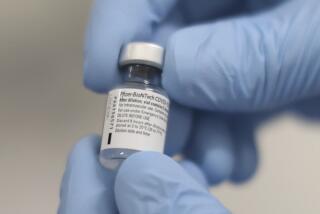AIDS Patients to Test Anti-Bacterial Drug : Medicine: San Diegans to be part of trial treatment to prevent an infection that strikes in late stages of AIDS.
- Share via
A community-based group established to give San Diego AIDS patients greater access to promising new drugs announced its first effort Tuesday, testing a drug aimed at a bacterial infection that affects AIDS patients late in their disease.
The Community Research Group will test an Ohio-based firm’s drug, rifabutin, to see if it succeeds in preventing AIDS patients from being infected with Mycobacterium avium.
Although this bacterium is thought to infect some AIDS patients early in their disease, it is not known whether it shortens their survival, said Dr. David Feigal Jr., medical director for Community Research Group.
The infection often doesn’t have debilitating symptoms until an AIDS patient’s immune system is almost completely destroyed, he said.
Because of this, other earlier, often-fatal opportunistic infections such as AIDS-related pneumonia have had priority in federal drug studies.
However, Feigal is among those who think Mycobacterium avium will become more of a treatment issue, because patients will be living longer due to recent better treatments for pneumonia and other infections.
In the laboratory, rifabutin appears to be effective against Mycobacterium avium , a cousin to the tuberculosis microbe that is resistant to many antibiotics.
In late-stage AIDS patients, however, the bacterial load in the body can be so high that multiple antibiotics--including rifabutin--do not help much, Feigal said.
The symptoms of late-stage Mycobacterium avium infection include night sweats, intermittent fevers, chills, diarrhea and the extreme weight loss called wasting syndrome.
The San Diego trial will give half of the participants rifabutin and half a placebo to see if initial infection with the Mycobacterium is prevented.
To participate, people with AIDS have to have a T-4 cell count of less than 200, and not be infected already with the Mycobacterium avium , Feigal said. The lab work and drugs associated with the trial are free, paid for by the drug’s maker, Adria Laboratories of Columbus, Ohio.
Nationwide, the drug trial will involve 750 patients, said Rico E. Viray, project manager for Adria. Perhaps as many as 60 of those will be in San Diego, Feigal said.
This number is uncertain because the Community Research Group, which formed last summer under a volunteer board of directors, still is in an early stage of formation, said the group’s administrator, Gary Lewis, at a press conference held in Mayor Maureen O’Connor’s conference room at City Hall.
The group intends to enroll patients in the drug trial through their private physicians, in contrast with existing UC San Diego-based government drug trials.
So far, only about 50 physicians have been contacted, and 20 to 25 have responded positively, Lewis said. He said he isn’t sure how many potential patients they have.
Still, as its efforts increase there will be broader drug access for people infected with human immunodeficiency virus, HIV, Lewis predicted. The research also will be an avenue for addressing completely new treatment issues that are not being addressed by government-funded trials, he said.
For instance, the second research project the group plans will be for a liquid nutritional supplement, to see if it improves the condition of AIDS patients.
That is the kind of question that federally or state-sponsored AIDS treatment trials in San Diego would never address, Feigal said.
Such studies of “early interventions that keep people healthy” just don’t get done, he said.
Establishment of the San Diego Community Research Group follows a trend elsewhere toward treatment trials in which patients have more voice about what is studied. There are existing similar groups in Los Angeles, San Francisco and other cities.
Last year, the U.S. Food and Drug Administration approved the use of aerosolized pentamidine to treat AIDS-related pneumonia based on data gathered by community research groups in San Francisco and New York.
The San Diego effort was begun with a $25,000 seed grant from the American Foundation for AIDS Research. In addition to money provided by drug companies involved in tests, funding from government and private sources is being sought.
Principals in the local group include Terry Dearstone, president and board chairman; lawyer Scott B. Ehrlich, secretary, and Joy Galloway, financial officer.
The group also has a scientific advisory board. In addition to Feigal, an associate clinical professor of medicine at UCSD, it includes Dr. Samuel A. Bozzette, a leader in AIDS drug trials at UCSD.




